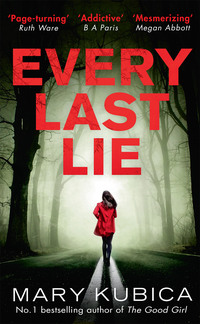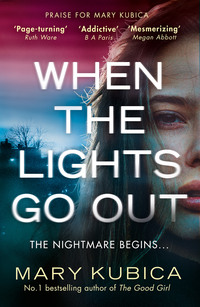
Полная версия
Don't You Cry
If you say so, was what I’d said before leaving the room. I wonder if it’s possible to hate someone and feel sorry for them at the same time? I felt sorry for her, sure. She wasn’t cut out to be a mother.
But I also hate her, too.
Pops is a lousy drunk, and the more he drinks, the more he thinks about my mother. About the way she left us all those years ago, without ever saying goodbye. About the fact that he still has their wedding photo framed and hung on the bedroom wall, about the fact that he still wears his wedding band, though she’s been gone a whole thirteen years. Since I was five. A little boy with Legos and Star Wars toys. That’s when she left.
If it was up to me I would have chucked that ring long ago. Not that I hold a grudge or anything, because I don’t. I just think I would have tossed the ring. Or pawned it like he pawned my high school class ring for booze. Instead, it becomes a hot topic of conversation in the many botched dates Pops has with the single ladies around town—a reservoir that is drying up quickly and will soon be completely sapped. Chances are he’s dated them all. Except for Ingrid, maybe, the agoraphobic, for reasons I don’t need to explain. Pops spends his dates at the tavern in town, getting loaded and talking about how my mother left him and me when I was five years old. It’s supposed to be a sympathy trigger, but instead he ends up looking like a patsy. Pops ends up crying and scaring the ladies away one by one, like old cans lined in a row for target practice.
He has no clue why he’s still alone.
It’s pathetic, really. But he’s still my dad and I feel sorry for him, too.
I dish the nuggets and green beans onto a chipped dinner plate and call him to dinner, where he lumbers in—beer in hand—and takes his place at the head of the table, the only chair from which he can still see the TV. “Catch the fucking ball!” he screams, smacking the table hard with the palm of a sweaty hand, sending his fork spiraling into the air before it crashes down to the ground. As he reaches down to grab it, he smacks his head on the corner of the wood table and curses. And then he laughs as his forehead swells and turns bright red.
Just another night in our house.
Tonight we don’t make small talk. Instead, I model good behavior, the way you’re supposed to use a knife to spread butter, the way you’re supposed to eat the beans with a fork and not your hands. I watch as Pops drags half of a dinner roll through the tub of margarine and think: no wonder this guy is still single. He had a lot more to offer my mother when he was young, employed and sober. Needless to say, he’s no longer any of those things. But the reason she left had nothing to do with any of those things, anyway. The reason she left? Motherhood. Me.
I try not to let this go to my head.
“They’re not French fries,” I say as he plucks the fancy-cut green beans up one at a time with a hand, drawing them to his mouth and chewing with his jaws open wide. “Use your fork.” He ignores me and screams at the TV, spittle flying out. Green spittle, like the beans.
He rises to his feet and hollers, “False start!” pointing a finger at the referees on TV as if they can hear. “What are you, asshole, are you blind? That was a false start.”
And then he sits back down.
I watch as he sits there at the table, eating his food. I note the way his hands shake. Pops has a tremor, whether or not he knows it exists. I know. His hands shake, the small, rapid movements when he’s trying to use his hands for something: picking up his nuggets, snapping the top off another bottle of beer. They remind me of my grandpa’s hands, though his only shook because he was old. There are times Pops’s hands shake so badly I have to open up his beer for him. The incongruity of it? The more he drinks, the less his hands shake, like some sort of paradoxical reaction. The hands find placidity when he’s completely tanked. Seems to me it should be the other way around, but still, the shaking hands are a good benchmark for me of how much he’s had to drink. It’s never worth asking how much he’s had to drink; he’s either too drunk to remember, otherwise he’ll lie. Tonight, not enough.
He stands up again quickly to chastise the coach who decides to run it up the middle instead of a sweep play. And then back down. And then up again when the ball gets knocked out of the running back’s hands and there’s an interception—this time managing to overturn his chair as he does. He watches in dismay as the Giants trot down the field with the ball. I don’t even have to turn my head to see the TV. He narrates it for me before tossing the other half of his dinner roll at the screen. And then he gets up to get another beer, damning to hell every Lions player on the field.
So it’s really no wonder then that when he says, “Squatters,” I don’t pay much attention. He’s talking about the TV. It’s someone’s last name, or some epithet he’s come up with for one of the coaches or players. Fucking Squatters.
“Did you hear me?” he asks, and that’s when I realize he is talking to me. His shirt is wet; at some point or other he managed to spill his beer. There’s a piece of green bean stuck to his chin. Classy.
I notice that Pops isn’t looking at me, and I turn in my chair, my eyes copying his line of vision, out the front window of our home and across the street.
And there I see it again, that light: on, off.
Like an involuntary muscle contraction. A charley horse. A twitch, a tic.
On, off.
And Pops says, “Damn squatters are living over there again,” about the school-bus-yellow home on the opposite side of the street from ours. The one with the story to tell, the kind of story no one ever talks about but everybody knows. It isn’t the first time squatters have lived over there before. All sorts of vermin have inhabited the place at one time or another. The occasional drifter has been known to move into that house and live there for a while, scot-free. They usually leave on their own without any need to call the cops or anything, but it’s unsettling nonetheless, knowing there’s some bum in a vacant house right across the street from yours.
In the backyard hangs an abandoned tire swing from a fated oak tree, forgotten along with the home. Curtains hang from the window still, dated gossamer curtains, which were once white. They’re yellowish now and sheared at odd angles as if someone took a pair of scissors to their ends. Instead, it’s likely the mice eating their way through the lace. The concrete crumbles from around the house like cookie crumbs, breaking off in bits and littering the lawn. There are posted signs, which no one pays attention to, anyway: No Trespassing and Not Approved for Occupancy. They’re black signs with a bright orange font. Hard to miss. And yet people do. They ignore the signs and go right in.
A bum is living over there or maybe... No. I shake my head. That’s not it. I said it already. I don’t believe in ghosts.
But that’s just me. The rest of the people in town, they do.
Every single town in all of America has its own haunted house.
Ours just so happens to be right across the street from mine.
I never knew the family that lived inside that home. All it’s ever referred to anymore is that house. It’s been empty for years, since before I was born. I guess I never cared enough to ask who used to live there. In my mind, they’re long gone, leaving behind trace memories of a once-happy family and a derelict home. The only inhabitant people speak of is the dead Genevieve, though she is only ever referred to as her, or sometimes the even less humane it. There are claims that people see her, the ghost, moving throughout the home, her soul trapped inside for all of eternity.
But I know better than to believe those things. It’s just a bunch of malarkey. There’s no such thing as ghosts.
“Fucking squatters,” says Pops one last time as he rises from the table and stumbles to the fridge for another bottle of beer. He puts the cap on the countertop; he wanders into the family room to resume watching the football game. He leaves his dirty plate behind for me to clean, his napkin lobbed to the floor for me to retrieve.
Quinn
I don’t have to wait too long to be put to the test again.
As I stand in the kitchen, in my hand the phone rings. Esther’s phone. I jump. This time it’s not a blocked call, but a local 773 number. The caller has an easygoing voice, upbeat, maybe the same age as me, though it’s hard to tell through the phone because of course I can’t see the woman on the other end of the line. She asks if this is Esther, and this time I assert proudly, “It is.”
It’s fun, masquerading around as Esther. I hold Esther in the highest regard. If there was one person in the world I’d like to be, it’s Esther. She’s beautiful and intelligent and kind. She’s dauntless and spunky sometimes, and a good roommate to boot.
But all those thoughts fall quickly by the wayside when the caller on the other end of the line announces, “I was inquiring about your ad in the Reader.”
“What ad?” I ask, forgetting for a fleeting moment that I am supposed to be Esther. She’s trying to sell some things, I figure, maybe cleaning out the crap in that storage facility. Who needs an old lava lamp, anyway? They’re way passé.
But when the woman on the other end of the line declares, “The ad for the roommate,” my mouth drops. I’m all but stunned speechless. “Have you already found someone else?” she asks, and a tremendous amount of time passes before I find the ability to speak.
A thousand thoughts run amuck in my mind, but at the very core of them is one question that comes to me again and again: Why? Why did Esther place an ad in the Reader, why is she looking for a new roommate, why does she want to do away with me? I’m hurt. My feelings are hurt like I’ve been stabbed in the back with Romeo’s dagger. I get it that I’m a slob and I pay a measly forty-five percent of the rent rather than the afore-agreed-to fifty, that I don’t always have the cash to cover my share of the utilities or that I leave lights on and forget to turn off the sink water. But still, Esther, I snap silently in my head, wondering suddenly who is the lousier roommate: Esther or me. How could you do this to me? Where did she possibly think I would go if she kicked me out? Back home to suburban America to live with my mother and father and Madison the dweeb? No way. Esther could have pointed out my deficiencies for me; we could have had a conversation about it. She could have given me some warning before deciding to kick me out. Some time to find a new apartment, a new roommate. My heart sinks. I thought Esther was my friend, but maybe I was wrong. Maybe Esther was just my roommate all along.
“It’s okay if you did. I mean, it’s not a big deal,” says the caller, but I clear my throat and swallow the overwhelming sense of betrayal and say to her, “No. I didn’t. I’m so glad you called,” and it’s then that I make arrangements to meet the young lady who’s about to be my replacement, who’s to take over my spot at the kitchen table, my place on the rose-colored sofa, the one who will soon inhabit my room, and become best friends with my best friend while I get tossed like leftover food.
I think of myself, all alone in the big city, without Esther. I can’t afford the rent in a city apartment on my own if my life depends on it. Eleven hundred dollars a month this unit costs, which in Chicago is quite the steal. Esther has lived in this apartment for years, the reason it was cheaper than all its other walk-up counterparts in the neighborhood: rent control. If I walked into Mrs. Budny’s office today and told her I wanted my own apartment, identical to the one I share with Esther, she’d charge me sixteen hundred bucks a month and I don’t have anything in the realm of that kind of money.
I agree to meet with my replacement after work tomorrow at a small coffee shop on Clark. We say our goodbyes and I pull up the Reader online, and sure enough, there it is, the ad. Female in need of roommate to share 2BDR Andersonville apartment. Great locale. Call Esther, and there she leaves her cell phone number beside a photograph of our walk-up from the outside, the autumn leaves tumbling from the trees as if she’d taken that photo yesterday or maybe just the day before.
Why, Esther? I silently beg. Why?
MONDAY
Alex
I rise early, well before the sun, and head out into the cold morning air for the long haul to town to retrieve Ingrid’s groceries for her as promised. The air is nippy today, making it hard to breathe. It burns my lungs, freezes my hands and ears as I close and lock the door behind myself, shutting a dozing Pops inside. In my hand I carry bills to discard in the mailbox outside. I used last week’s paycheck to cover them, the gas bill coming with a Final Notice that we’d soon be without heat. Its arrival a week ago yesterday prompted a scolding of Pops about how he’d better get his shit together and find a job.
I’m glad to see he took it to heart.
As I make my way to the mailbox, I eyeball that old, abandoned home across the street, searching for potential squatters or other signs of life. It’s an ugly sight, it is, one of the few scars on our otherwise tolerable street. There are vacant houses, properties foreclosed on, new homes stymied in the midst of construction, plywood and two-by-fours and other building supplies still taking up residence on the weedy lawns. It’s a sign of the times, the housing crisis of our generation that other generations will read about in history textbooks to come. I’m kind of stoked about it in some weird way, knowing these abandoned, beaten-up, unloved homes are making history as we speak.
The people in the neighborhood are mostly blue-collar workers, many commuting from as far as Portage, Indiana, or Hobart, to earn a paycheck and pay their bills. They work mainly in the manufacturing industry, if they’re not working retail for some shop in town. Money is harder to come by here than it is for others, and yet we’re better off than those in the slummy apartments off Emery Road, the subsidized housing units, low-income apartments paid for in part by the US government.
But regardless of how many scourged homes there are on the block or in town, this is the house everyone always talks about: that school-bus-yellow, minimal traditional home with its aluminum siding and its busted roof, right across the street from mine.
That house wasn’t always a blot on the landscape. Though I’ve never seen it as anything but a blight with my own two eyes, I’ve heard this from neighbors who stand on their front lawns from time to time, arms crossed, frowning at what it’s become over the years. It wasn’t always such an eyesore, they tell me. A damn shame, they say. There was a time when the house was actually lived in and nice. Neighbors want it demolished, but the bank that owns the property doesn’t want to pay for that. That costs money. And so they leave it be. The house is a pockmark now, though it’s always been this way, since I was a little thing myself. Like the rest of the world I wish someone would level it to the ground and take it out of its misery.
And then of course there are the stories of the ghost of Genevieve.
Kids (gutsy, stupid or otherwise) have been known to creep to the windows and peer in, spying her wraith through the panes of glass. But it isn’t just the kids. No, adults claim they see her, too, a tiny apparition in white drifting from room to room, lost and alone, calling for her mommy.
In middle school, it’s a rite of passage, being dared to spend the night inside the haunted house. I did it myself when I was twelve. Sort of. We made it a couple hours, at best. Half the battle was getting out of your own house without your mom or pop taking notice, though my pop was so ripped he didn’t know whether I was here or there or anywhere. But the other guys had to lie to their folks, saying they were sleeping somewhere else, or climb out their bedroom windows long after they were supposed to be asleep.
But it was an initiation of sorts, being recruited from the nerd herd to the in-crowd, all by spending the night with a spook.
And so we did. Or tried to at least. A bunch of buddies and I packed bags full of flashlights, lockback knives, binoculars and food, and double dog dared one another to spend the night there, in that yellow house with a ghost. Why? Don’t ask me why. We just did.
We had a disposable camera with us, too, to take pictures to show off the next day at school. Proof that we did it. We spent the night with a spook and we survived. Some guy tagged along with night-vision, another with a camcorder. Another with something he claimed was a thermal imager (it wasn’t). We climbed in through a busted window—me scratching my shin on a shard of glass—and set up camp in what was one day the living room of a happy family, with sleeping bags, pillows and all. We snapped photos, the guys and I—beside the cobwebbed fireplace, sitting on an old sunken-in sofa that seethed with bugs, crossing the threshold to her room. Her room.
Genevieve’s room.
From the stories I’ve heard over the years, Genevieve was a naughty little girl. In the five years before her death, she was caught more than once upsetting bird nests, and pulling the legs one by one off the thorax of ensnared bugs. It’s the kind of thing people remember about Genevieve, little Genevieve climbing a tree to jettison robin fledglings to the ground, whereby she scampered down the tree and stepped on them, while mama robin watched on, defenseless, unable to do a thing to save her babies. The kids in the neighborhood at the time, adults now, long gone—though their parents remain—recall the way their children didn’t want to play with Genevieve. Genevieve was cruel. Genevieve was mean. She pulled their kids’ hair; she called them names. She made them cry and fake stomachaches, saying they didn’t want to go to school, because once there Genevieve would punch them in the gut and kick their shins. She had a temper, a nasty temper, or so I’ve heard, and not just the typical pouting, crying, whining behavior of a usual five-year-old child, but a five-year-old who could’ve used a straitjacket or, at the very least, some mood stabilizing drugs.
No wonder half the town is certain she came back as a ghost, to haunt them even in death.
The guys and I made it in that old house a few hours at best before figuring out we weren’t the only ones there, and we ran. It had nothing at all to do with a ghost. It was the rats that did us in. The damn rats. Roof rats. We didn’t make it past 11:00 p.m., when they came out in search of food.
Even these days, all these years later, there are allegations of strange noises at night. A child singing lullabies, a child’s cry.
Me? I’m pretty sure it’s just the wind.
But others aren’t so sure. Some people are superstitious enough not to walk past the house, and so they cross the street to my side instead. Others hold their breath the whole darn way, like passing a cemetery and holding your breath to make sure you don’t breathe in the spirit of the dead. They tuck their thumbs inside their fists, too, but I don’t know why. I just know that they do. Death superstitions are the norm around here.
If your shadow is headless, you will die.
An owl sighting during the day means death is coming.
A bird crashing into a window also means death is near.
Death comes in threes.
And corpses should always be removed from a home feetfirst. Always.
I don’t buy any of it. I’m far too skeptical for that.
Funny thing is, she didn’t even die in that house. That’s where she lived, sure, where Genevieve lived, but that’s not where she died. So how could her spirit be there?
But maybe that’s just me being overly pragmatic.
Конец ознакомительного фрагмента.
Текст предоставлен ООО «ЛитРес».
Прочитайте эту книгу целиком, купив полную легальную версию на ЛитРес.
Безопасно оплатить книгу можно банковской картой Visa, MasterCard, Maestro, со счета мобильного телефона, с платежного терминала, в салоне МТС или Связной, через PayPal, WebMoney, Яндекс.Деньги, QIWI Кошелек, бонусными картами или другим удобным Вам способом.









